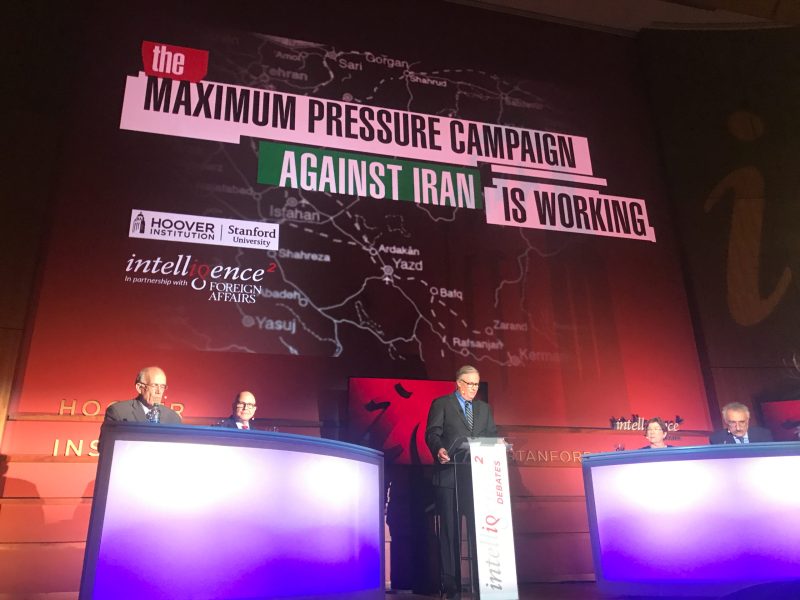Former National Security Advisor H.R. McMaster delivered a fiery defense of the killing of Iranian general Qasem Soleimani in a debate at the Hoover Institution on Tuesday. The debate was focused on whether the Trump administration’s “maximum pressure” campaign against Iran is working.
“It was the righteous use of violence,” McMaster said. “I don’t really care what international law said. I think Article II of the Constitution gave the president the authority to make the decision he made.”
The debate, hosted by the media company Intelligence Squared, featured two academics on either side of the “motion” that “the maximum pressure campaign against Iran is working” in a wide-ranging conversation that grew most heated around the killing of Soleimani and the impact of sanctions on the Iranian people.
McMaster and military historian Victor Hanson, speaking in support of the Trump administration, cited a litany of Iranian aggression in arguing that “conciliation” has repeatedly failed and that intense pressure is the only way to incite change.
“If there was a success to the previous [administration’s] Iran policy, it was empowering Iran across the region in a way that was a fundamental disaster for the Arab states and for Israel,” McMaster said.
He stepped down as national security advisor in April 2018 after public disagreements with President Donald Trump over policy in Russia and Syria. He joined the Hoover Institution as a senior fellow that fall.
Terrorism studies expert Marsha Crenshaw and Iran scholar Abbas Milani, challenging the notion that the maximum pressure campaign is working, argued that the tactic is an erratic strategy that hurts the Iranian people without leading to change in the Iranian government.
“It’s a very bad thing to have two irrational, unpredictable leaders on each side when the risk of escalation is truly devastating,” Crenshaw said.
Audience opinion selected the winner of the debate. At the beginning of the event, audience members voted for, against or undecided on the “motion.” At the end of the debate, once arguments had concluded, they voted again.
Crenshaw and Milani, whose support increased from 38% at the start to 48% at the end, were named the winners. McMaster and Hanson’s support increased from 41% to 45%.
Both sides were united in their condemnation of the Iranian regime, but tensions flared at several points.
The two sides disagreed on the Trump administration’s decision to kill Soleimani, whose death by a Jan. 3 drone strike raised concerns that the United States and Iran were moving toward war.
“This was a man who was traveling the region at that moment for the specific purpose of planning mass murder attacks against Americans in the region,” McMaster said, after telling the audience that he didn’t care what international law said. “It would have been negligent not to kill him.”
Milani replied, “I do care about international law.” Killing Soleimani “scared the bejesus out of the Iranian regime,” he said, but it came at the cost of breaching international law.
“The United States can’t be seen as a country that can take the law into its own hands,” he said.
Early in the debate, Hansen also argued for restrictive sanctions against Iran, saying that the “short-term suffering” they cause the Iranian people are justified by the potential for long-term regime change.
During the audience-question portion, a woman challenged Hansen’s description of the sanctions’ impacts as short-term.
“How is it that the impact of my people not having food, not having medicine, is dismissed as a temporary issue?” she asked.
In January, the Trump administration opened access to medicine for cancer and organ transplant patients, according to The New York Times.
Hansen replied that he had “great empathy” for the Iranian people, as an audience member called out, “No, you don’t.”
“The fact that they have a history of aggression against Western interests and the United States in particular, and you have the force multiplier factor of a nuclear weapon, that puts everybody in the sphere of the United States in danger, and every government has the responsibility to their own people first,” Hansen said. “The responsibility of this government is to protect it from a nuclear weapon from Iran or its interests.”
Another audience member asked the debaters about the wisdom of having an unpredictable United States and Iran clash in the Middle East.
Hansen, the author of the 2019 book “The Case for Trump,” took issue with her framing.
“You’re equating a theocratic, authoritarian government that just killed 1,500 of its own people with a constitutional republic whose chief executive is subject to audit by the Congress and the Supreme Court,” he said, to gasps, laughter and applause.
Contact Erin Woo at erinkwoo ‘at’ stanford.edu.
